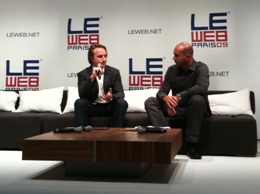
Le Web organizer Loïc Le Meur interviewed one of the guests he invited to come speak at the conference, YouTube co-founder Chad Hurley.
The pair talked YouTube’s product strategy but also Hurley’s recent personal investment in the new U.S. Formula One Racing team USGPE (previously US F1).
Loïc Le Meur: what is this with you investing in an F1 racing team?
Chad Hurley: it’s an opportunity I came across, and I’d been wanting to do something related to sports, I just couldn’t decided which one. I really wanted to see how I could apply my knowledge in the video space to sports. I feel like I’ve made a good investment, and it’s also a nice hobby.
How does one convince Chad Hurley to invest in their company?
Well I’m not investing in many companies, I just wanted to see things shaken up in totally different market, something you can build from the ground up.
How much did you invest and how did it come about?
I can’t get into details, but it sure is an expensive sport. We connected, I was interested, that was it. I have many passions but I like to get involved deeply, so angel investing isn’t really my thing. Like, and this is not widely known, I started this company called Hlaska, an apparel and wallet store. Totally random, but I enjoy it. We’ve opened a retail outlet in San Francisco and we’re opening another store in San Jose soon.
How much time is left for YouTube?
The projects we talked about are ongoing, but make no mistake: all my time goes to online video and YouTube in particular. We’ve come a long way with the company, you know, we have big audience with people watching over a billion videos a day and uploading over 24 hours of content every minute. It’s impossible to keep up with it, but I try. I basically watch videos online all day long.
Can you share YouTube revenues?
Google obviously doesn’t let me disclose that information. Very roughly though: revenues are going up, while costs are coming down. We’re in a great position, even in this economic environment. But I can’t get into the details.
How did you get the idea for YouTube?
Everyone must know this story by now. We essentially wanted to make video easy to deal with, for ourselves. Simplify the process, not making people think about things a lot, let us take care of the background stuff like the encoding etc. We associated a brand with it, offered tools and made it easy for people to share videos. The network effect took care of the rest.
So what’s next for the service?
We want people to do more with online video on YouTube, of course. What we’re very focused on right now is content discovery technology and how to make the finding great videos easier for users, based on their profile and past usage.
Do you have tips on how to make videos more viral?
Well, if you punch me in the face right now, I can assure you it would spread quickly. But seriously, there’s no magic recipe, but there are ingredients that works, clearly. We want to give everyone the same fair chance to be seen and get discovered.
Do you consider YouTube to be social software?
To a degree, but we also leverage existing social services like Twitter, OpenSocial, etc. We’re still at core a video platform. Subscribing to videos and sharing them is social activity of course, and we’re continuing to tweak the process. But I wouldn’t call us a social destination per se, more of a video-centric destination with a social layer on top.
Also worth pointing out: we’re big on partners, big or small, we want to see them succeed. We’re pleased to see some of our top users, although only a handful, earn over a million dollars a year using YouTube. We aim to continue to innovate and cater to our partners even better.
Is mobile important, and what’s going on in that area at YouTube?
Yes, it’s definitely a key part of our strategy. We’re pleased with the mobile content consumption side of the equation, but I’ll be the first to acknowledge that we need to work on making uploading through mobile devices far better.
Robert Scoble: I like the fact that you’re starting to stream big events live on YouTube. Are there any plans to enable users to do live video broadcasting on YouTube at some point in the future?
We see the value of that functionality for our average user, but it’s not our focus, because frankly we have our hands full running YouTube the way it is. If we ever move into the live broadcasting space, it’ll most likely be through partnerships and integration of third-party services rather than us launching new features.
We definitely want to do more live event streaming though, possibly make it a monthly occasion.